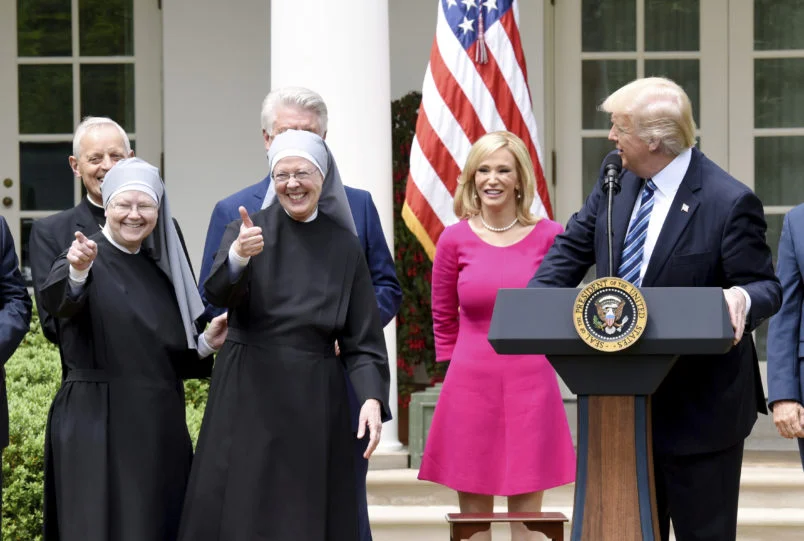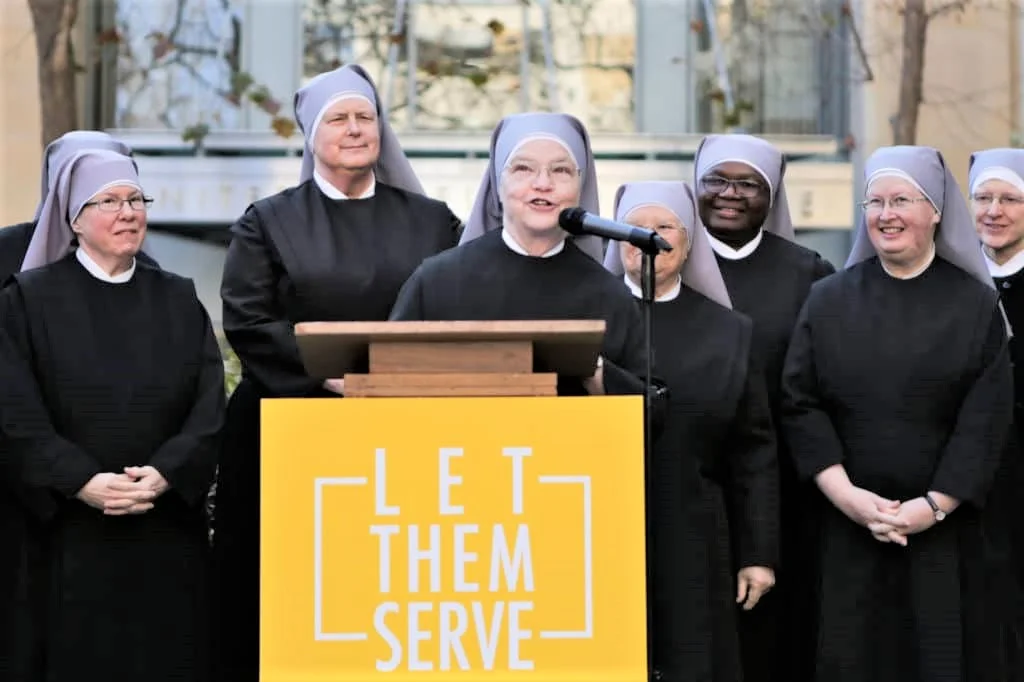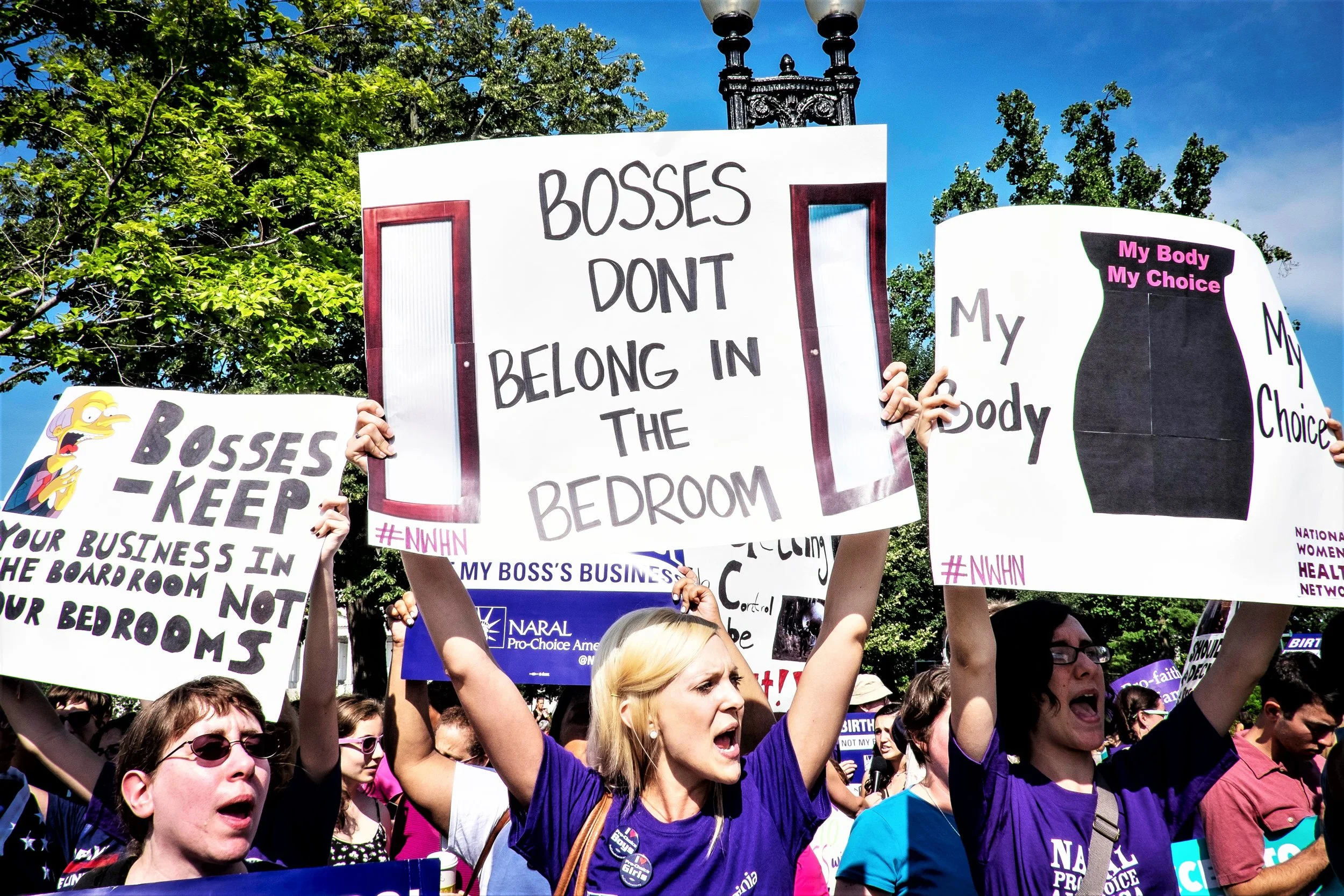The Little Sisters of the Poor Joined Trump Administration To Again Attack Contraception Coverage At SC
/Photo by: Jacquelyn Martin. Nuns with the Little Sisters of The Poor, including Sister Celestine, left, and Sister Jeanne Veronique, center, rally outside the Supreme Court in Washington, Wednesday, March 23, 2016, as the court hears arguments to allow birth control in health care plans in the Zubik vs. Burwell case. (AP Photo/Jacquelyn Martin) ** FILE **
By Jessica Mason Pieklo. First published on Rewire.News.
Conservatives have spent the better part of a decade arguing the Affordable Care Act’s birth control benefit, which provides insurance coverage for a host of contraception without additional cost or co-pay, violates religious freedom principles. Those efforts have had mixed results. Despite two turns before the U.S. Supreme Court, dozens of lower court orders, and a handful of executive orders from President Trump, the benefit remains in place—but employers who object to it can avoid complying with it.
This week, the Roberts Court will consider taking up a case that could settle the birth control benefit’s fate once and for all.
The case is The Little Sisters of the Poor Jeanne Jugan Residence v. California. Yes, that’s right. The Sisters are at it again.
To understand how yet another case like this could end up before the Roberts Court, let’s revisit for a moment the history of the contraception mandate. Originally proposed in 2012, the birth control benefit requires most employers to include coverage of FDA-approved contraceptives without co-pay in their employer-sponsored health insurance plans. The benefit contains an exemption for religious employers and an accommodation for religiously affiliated employers. The benefit, and the exemption and accommodation, launched a wave of objections and lawsuits that has not yet receded. The first batch of those lawsuits reached the Roberts Court in 2014 in Burwell v. Hobby Lobby, in which the Court ruled that some for-profit employers could take advantage of the accommodation process.
Despite that win, conservatives were not satisfied. Two years later, another birth control benefit case reached the Supreme Court: Zubik v. Burwell. Zubik was actually a series of challenges brought by religiously affiliated nonprofits like the Little Sisters of the Poor, who argued they should be exempt from the benefit’s coverage requirements. The Roberts Court, at that point down to eight members following Justice Antonin Scalia’s death, punted on a decision and instead sent the cases back to the appellate courts with instructions to the party to “work it out” and find a compromise or a solution to the fight.
At Religious Freedom Order Signing, Little Sisters Of The Poor Join Trump. Via TPM
That never happened. And once President Donald Trump took office, the fight escalated.
In May 2017, Trump issued an executive order, “Promoting Free Speech and Religious Liberty,” that purported to end any legal obligations the Little Sisters and other religiously affiliated employers had in complying with the benefit.
Then in October 2017, the administration announced new rules that granted secular employers with religious and moral objections to providing contraception coverage the ability to opt out of the birth control benefit. A coalition of states led by California sued the Trump administration to block the rules, arguing they violated the Administrative Procedure Act (APA), the federal law that dictates how such rules are to be issued. The federal courts agreed, issuing nationwide injunctions against them.
During the course of that litigation, the Little Sisters rushed to the the new rules’ defense, becoming the face of the litigation moving forward.
That’s an important strategic posture for conservatives. During the Obama administration, conservatives played up the optics of the federal government “forcing” the Little Sisters to comply with the benefit, as though nuns were handing out birth control pills like Halloween candy with the Obama administration keeping watch. Of course, nothing of the sort happened. One of the most maddening aspects of the first round of Little Sisters litigation is that the nuns were never at risk of having to comply with the benefit. But the Obama administration didn’t press the issue, instead looking for some kind of compromise that never manifested.
But once Republicans took power, those optics—of the Little Sisters as helpless victims—were no longer as advantageous. The Trump administration, packed with religious conservatives and led by a president facing multiple credible allegations of sexual assault, was making good on its promise to roll back reproductive rights and access to comprehensive health care, with states stepping in to challenge those actions. The Little Sisters of the Poor and similarly situated employers were the beneficiaries of those efforts. They could no longer argue they were facing religious persecution by the federal government.
Instead, the Little Sisters became the public face of defending the administration’s birth control rules, including at the trial and appellate courts. One glance at their petition to the Roberts Court asking it to take the case makes that clear. It reads as though it was filed by the Trump administration defending its own agency’s action, not by a private party. There is little, if anything, distinguishing the Trump administration and the Little Sisters when it comes to a desire to give employers seemingly endless power to restrict the rights of their employees, including the right to non-discriminatory health care benefits.
“The federal government is enjoined if it does, enjoined if it doesn’t,” the Little Sisters’ petition states. “It is subject to a patchwork of injunctions forbidding it to enforce the contraceptive mandate regulations against religious employers around the country, and it has multiple injunctions prohibiting it from implementing a regulatory fix. Three years later, it is clear that the litigation will not end until this Court answers the [Religious Freedom Restoration Act] question.”
There are few reasons why the Roberts Court should grant the Little Sisters request and take this case. For starters, the underlying litigation challenging the Trump administration’s rollback rules is still pending. There are no appellate decisions at all, let alone any that have endorsed the Trump and Little Sisters’ position that these new birth control rules that grant wide exemption rights to employers are acceptable.
But as I’ve argued before, conservatives don’t always file petitions to the Roberts Court thinking the Court will grant their request. Sometimes they file those positions to do some pre-advocacy before the Court. This is the case in the never-ending fight over abortion restrictions in the states, where advocates file cert petition after cert petition in part to keep a particular narrative before the justices. In this case, the narrative is that the Little Sisters must still provide contraception benefits to which they object, and their only path out is through a ruling from the Roberts Court striking the birth control benefit entirely.
It’s that last part that acts as the real tell by conservatives. Republicans’ repeated attacks on the birth control benefit are, after all, a key component of their attack on the law as a whole. They have repeatedly failed at their efforts to repeal the Affordable Care Act (ACA) in Congress. They’ve largely lost in their legal challenges to it as well. At the beginning of July, the Fifth Circuit Court of Appeals will hear oral arguments in the most recent of these attempts. And while the Fifth Circuit is a very conservative federal appeals circuit, a win for Republicans is not a given.
In fact, the only area where conservatives have had any real success in attacking the ACA is via targeting the birth control benefit in the courts. So when the Little Sisters, and by proxy Republicans, say only the Roberts Court can solve the “problem” of the birth control benefit—and a major part of the ACA—believe them.
The Court could decide as early as next week whether it will take the Little Sisters’ case.



